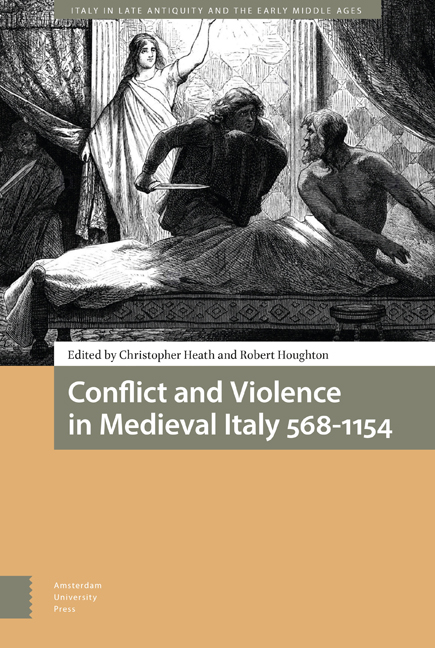Book contents
- Frontmatter
- Table of Contents
- Abbreviations
- Preface
- 1 Introduction: Discordant Minds and Hostile Nations
- 2 Morbidity and Murder: Lombard Kingship’s Violent Uncertainties 568-774
- 3 Insurgency and Counterinsurgency in Lombard Italy (c600-700)
- 4 Troubled Times: Narrating Conquest and Defiance between Charlemagne and Bernard (774-818)
- 5 ‘Nec patiaris populum Domini ab illis divinitus fulminandis Agarenis discerpi’: Handling ‘Saracen’ Violence in Ninth-Century Southern Italy
- 6 Formosus and the ‘Synod of the Corpse’: Tenth Century Rome in History and Memory
- 7 Sex, Denigration and Violence: A Representation of Political Competition between Two Aristocratic Families in Ninth Century Italy
- 8 ‘Italy and her [German] Invaders’: Otto III’s and Frederick Barbarossa’s Early Tours of Italy – Pomp, Generosity and Ferocity
- 9 ‘I Predict a Riot’: What Were the Parmense Rebelling Against in 1037?
- 10 The Strange Case of Deusdedit and Pandulf: Two Accounts of Honorius II’s Election
- Afterword
- Index
1 - Introduction: Discordant Minds and Hostile Nations
Published online by Cambridge University Press: 07 September 2022
- Frontmatter
- Table of Contents
- Abbreviations
- Preface
- 1 Introduction: Discordant Minds and Hostile Nations
- 2 Morbidity and Murder: Lombard Kingship’s Violent Uncertainties 568-774
- 3 Insurgency and Counterinsurgency in Lombard Italy (c600-700)
- 4 Troubled Times: Narrating Conquest and Defiance between Charlemagne and Bernard (774-818)
- 5 ‘Nec patiaris populum Domini ab illis divinitus fulminandis Agarenis discerpi’: Handling ‘Saracen’ Violence in Ninth-Century Southern Italy
- 6 Formosus and the ‘Synod of the Corpse’: Tenth Century Rome in History and Memory
- 7 Sex, Denigration and Violence: A Representation of Political Competition between Two Aristocratic Families in Ninth Century Italy
- 8 ‘Italy and her [German] Invaders’: Otto III’s and Frederick Barbarossa’s Early Tours of Italy – Pomp, Generosity and Ferocity
- 9 ‘I Predict a Riot’: What Were the Parmense Rebelling Against in 1037?
- 10 The Strange Case of Deusdedit and Pandulf: Two Accounts of Honorius II’s Election
- Afterword
- Index
Summary
In his Études sur l’histoire des principautés lombardes de l’Italie méridionale et de leurs rapports avec l’empire franc, René Poupardin observed that the Lombard Mezzogiorno of the early Middle Ages encapsulated ‘un récit de lutte intestines aussi stérile qu’obscures’. A concentration on the dismal and often convoluted picture painted by monastic chroniclers, would prompt a belief that ‘these rough and violent times’ do no merit serious study. Yet analysis of the processes, problems and potentialities that both conflict and violence created, allows an engagement with fundamental issues that affected early medieval Italy. Yet, one may adopt a viewpoint that sees in the apparent violence and conflict of this period an opportunity to understand how individuals and societies grappled with and resolved the issues they faced and withstood. Conflict and violence were vital forces in the formation of polities, and the management of such tells us more about the underlying processes of societal formation and cohesion, instead of being a mere grammar of violence.
This book is concerned with understanding the vital forces at work on the ground by identifying how tensions between conflict and stasis were worked out through the witness of a variety of source material – textual in all formats, both normative and narrative, and where relevant archaeological. It is not, however, concerned with what might be called the mechanics of violence, in other words violence in and of itself, but rather in the impact of this violence on societies and elites. In short, did such activity prompt significant, systemic and substantive change? How does violence shape Italian society in this period? What were the short- and long-term consequences of such violent activity? The ten contributions in this volume seek to interrogate, at specific points chronologically in the trajectory of early medieval Italy, the experience, the impact and the containment or management of social, political, and religious violence. It should not be assumed, however, that there is any teleological inclination in this volume, to suggest that the early Middle Ages in Italy were any more or less violent than the periods that preceded or that followed. This would be an undertaking of doubtful empirical value, let alone one which could be demonstrated in any objective sense.
- Type
- Chapter
- Information
- Conflict and Violence in Medieval Italy 568-1154 , pp. 11 - 62Publisher: Amsterdam University PressPrint publication year: 2021



